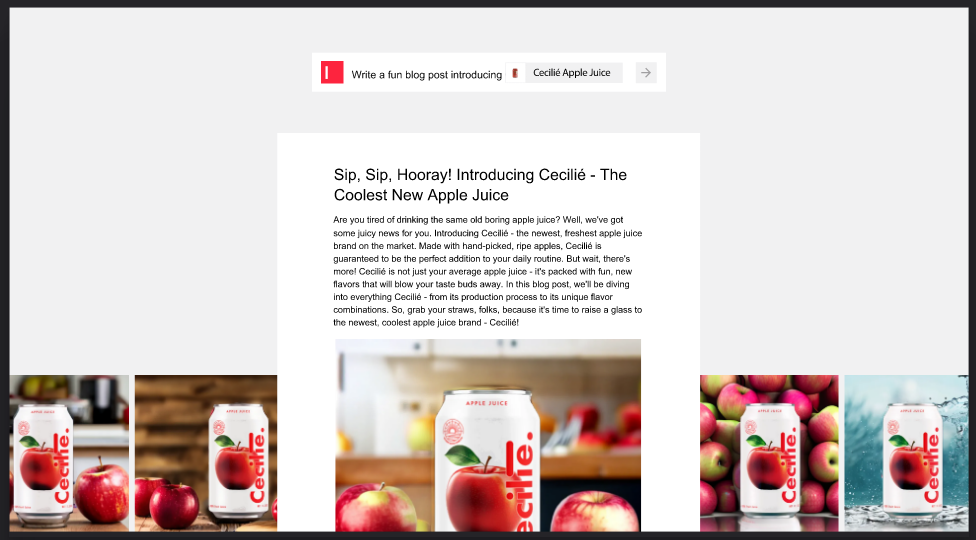Typeface, a startup developing an AI-powered dashboard for drafting marketing copy and images, emerged from stealth this week with $65 million in venture equity backing from Lightspeed Venture Partners, GV (Google Ventures), M12 (Microsoft’s Venture Fund) and Menlo Ventures.
Founded by former Adobe CTO Abhay Parasnis, Typeface attempts to combine generative AI with a brand’s tone, audiences and workflows to — as Parasnis rather aspirationally puts it — “reimagine” content workflows and corporate content development.
“We provide a generative AI application that empowers businesses to develop personalized content,” Parasnis said. “CEOs, CMOs, heads of digital and VPs and directors of creative are all expressing a growing demand for combining generative AI platforms with hyper-affinitized AI content to enhance the future of content workflows.”
Using Typeface, customers can type in a command like “Write a fun blog post about apple juice” to have the platform execute it, writing a several-paragraph draft piece complete with images. The tone of any images and copy can be customized to target certain demographics, or to align with a brand’s style guidelines.
Certainly, there’s a strong desire among the enterprise to leverage generative AI for advertising use cases.
Over the past few months, agencies contracted by Heinz, Nestlé, Bacardi-owned Martini & Rossi and Patrón have launched ad campaigns using imagery created by text-to-image systems such as OpenAI’s DALL-E 2 and Midjourney. Just last week, Coca-Cola inked a deal with OpenAI to leverage the company’s text-writing ChatGPT and DALL-E 2 to craft ad copy, images and personalized messaging.

There’s a growing industry, in fact, of generative AI startups focused on marketing- and ad-specific applications. Startups like Movio, Copysmith, Copy.ai, Sellscale, Jasper, Omneky and Regie.ai are using generative AI to create (ostensibly) better marketing copy, imagery and even video for ads, websites and emails.
Uptake has been swift. Statista reports that 87% of current AI adopters are already using, or considering using, AI for improving their email marketing. Another report projects that the market for generative AI will be worth more than $110 billion by 2030.
But with the increasing competition, beyond early winners like OpenAI, it’s not clear which startups will come to stand above the rest in terms of market traction. Parasnis asserts that Typeface has a fighting chance, owing chiefly to its platform’s safety and governance capabilities as well as its ability to incorporate “brand-specific” visual assets.
Safety is particularly important from a brand perspective where it concerns generative AI. Even the best text-generating AI today have been shown to make up facts and spout toxic content, content filters or no. Image-generating AI, meanwhile, has come under scrutiny for copying elements of the art and photos in its training data without necessarily attributing them. Getty Images among others have sued prominent creators of generative AI image systems for allegedly infringing on their intellectual property.
Typeface isn’t the only platform doing this. But it does have some traction — Parasnis says that the company has customers in industries including marketing, advertising, sales, HR and customer support. One client, Sequoia Benefits Group, is using Typeface to create copy and imagery for marketing and HR teams.
“As we emerge from stealth, we are excited to see strong early interest and engagement from a diverse range of mid-large enterprises,” Parasnis continued. “This level of customer response underscores the rapid market growth and highlights the appeal of our unique enterprise-minded vision for micro-personalized, secure content for teams.”































Comment